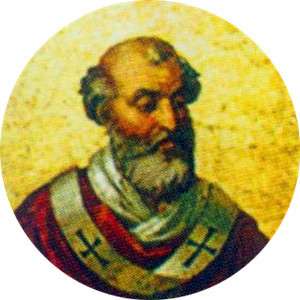Pope John IV
- Pope John IV can also refer to Pope John IV of Alexandria.
| Pope John IV | |
|---|---|
 | |
| Papacy began | 24 December 640 |
| Papacy ended | 12 October 642 |
| Predecessor | Severinus |
| Successor | Theodore I |
| Personal details | |
| Born | Dalmatia early Albania |
| Died |
12 October 642 Vatican |
| Other popes named John | |
Pope John IV (Latin: Ioannes IV; died 12 October 642) reigned from 24 December 640 to his death in 642. His election followed a four-month sede vacante.[1] He became the first of 11 Greek-speaking popes between 640 and 752, who introduced Greek customs and characteristics to the Roman church.[2]
Pope John was a native of Dalmatia (probably in the town of Salona).[3] John was descended from Romans. He was the son of the scholasticus (advocate) Venantius. At the time of his election he was archdeacon of the Roman Church, an important role in governing the see. As John's consecration on 24 December 640 followed very soon after his election, it is supposed that the papal elections were being confirmed by the Exarch of Ravenna rather than by the Emperor in Constantinople.
Troubles in his native land caused by invasions of Slavs directed John's attention there. To alleviate the distress of the inhabitants, John sent the abbot Martin into Dalmatia and Istria with large sums of money for the redemption of captives. As the ruined churches could not be rebuilt, the relics of some of the more important Dalmatian saints were brought to Rome. John erected an oratory in their honour which still stands. It was adorned by the pope with mosaics depicting John himself holding in his hands a model of his oratory. John endeavoured thereby to convert the Slavs in Dalmatia and Istria to Christianity. Emperor Constantine Porphyrogenitus claimed that Porga, duke of the Dalmatian Croats, who had been invited into Dalmatia by Heraclius, sent to Emperor Heraclius for Christian teachers. It is supposed that the Emperor to whom this message was sent was Emperor Heraclius himself, and that he sent it to Pope John IV.
While still only pope-elect, John, with the other bishops of the Catholic Church, wrote to the clergy of Ireland and Scotland to tell them of the mistakes they were making with regard to the time of keeping Easter, and exhort them to be on their guard against the Pelagian heresy. About the same time, he condemned Monothelism as heresy. Emperor Heraclius immediately disowned the Monothelite document known as the "Ecthesis". To Heraclius' son, Constantine III, John addressed his apology for Pope Honorius I, in which he deprecated the attempt to connect the name of Honorius with Monothelism. Honorius, he declared, in speaking of one will in Jesus, only meant to assert that there were not two contrary wills in Him. John was buried in the Basilica of St. Peter.
Notes
- ↑
 Herbermann, Charles, ed. (1913). "Pope John IV". Catholic Encyclopedia. New York: Robert Appleton Company.
Herbermann, Charles, ed. (1913). "Pope John IV". Catholic Encyclopedia. New York: Robert Appleton Company. - ↑ Joseph F. Kelly (2005). The Collegeville Church History Time-line (illustrated ed.). Liturgical Press. p. 9. ISBN 9780814628348.
- ↑ Wikisource:Catholic Encyclopedia (1913)/Pope John IV
References
- Sereno Detoni, Giovanni IV. Papa dalmata, Libreria Editrice Vaticana, 2006 ISBN 978-88-209-7889-1
- Luciano Rota, I Papi Caio e Giovanni IV, in Istria e Dalmazia. Uomini e tempi, II, Dalmazia, Udine, Del Bianco 1992
External links
| Wikisource has the text of the 1913 Catholic Encyclopedia article Pope John IV. |
- Catholic Encyclopedia: Pope John IV
- Cardinals of the Holy Roman Church
| Catholic Church titles | ||
|---|---|---|
| Preceded by Severinus |
Pope 640–642 |
Succeeded by Theodore I |

